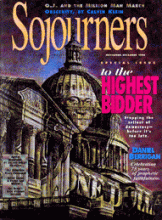In 1954, Russell Lynes, writing for Harper's,
lamented that the age of prosperity could not do for the arts what the Great Depression had. Depressions, notwithstanding their evils, create community and a climate "more interesting, more lively, more thoughtful, and even, in a wry sort of way, more fun."
Arguably, such qualifiers would describe little on the contemporary popular musical landscape. The narcissism of recent decades has created a depression of a different sort, not so much external but inside the empty halls of the contemporary American soul. On the musical scene, punk, gangsta rap, and grunge have done well to create a platform for existential angst, but with little attempt to nourish or deliver an emotional range any deeper than rage. While the Depression's economic destitution yielded a sense of community and possibility for hope, our prosperity today has resulted in violence and despair.
Insofar as twentysomethings live in an era of social decay- scarce employment, drugs, violence-a handful of new bands have responded to this emerging depression in ways unlike their peers. Although they can be found in the pop aisle of a record store, the roots of the Bottlerockets, the Jayhawks, and Uncle Tupelo lie in country music. In addition, using the best elements of some mainstream styles, each band slowly pieces together their own narrative on the American landscape. Together they've created a musical community of their own, touring together and playing on each other's albums, and shying away from a consumerist impulse.
Geography plays an important role, too. The Bottlerockets are Rust Belt borne-a reality that their amplifiers loudly manifest. Rock music has long eulogized, sometimes romanticized, the blue-collar life. But rarely has a band from an insider's perspective simultaneously praised and criticized, none-too-lightly, Midwestern culture. Frontman Brian Henneman is a redneck and proud of it. At times
Read the Full Article
